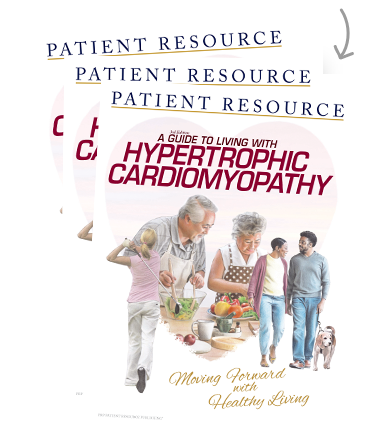Moving Forward
Prepare for a fulfilling life after an HCM diagnosis
Learning you have a life-long genetic condition like HCM can feel overwhelming, but you can take steps to reduce your risk of future heart- related issues by empowering yourself to make good lifestyle choices. It may help to think of managing HCM like other chronic conditions, such as diabetes or asthma. With the help of your medical team, treating and managing HCM is possible.
Getting a Second Opinion
Knowledge is power, and learning as much as you can about HCM may help you feel more confident moving forward. This may include getting a second or third opinion to confirm the diagnosis and potential treatment options. Another doctor’s opinion may change the diagnosis or reveal a treatment your first doctor was not aware of. And, this is the perfect time to seek out a doctor who specializes in HCM and who may have access to leading-edge therapies.
Other opinions are valuable because doctors bring different training and experience to treatment planning. Some may favor one treatment approach, while others might suggest a different combination of treatments.
A second opinion is also a way to make sure your pathology diagnosis is accurate. You need to hear all the facts about your treatment options. There is often collective wisdom gained from the experience and opinions of different specialists who are experts in HCM.
Finding these experts is not always easy, and you may worry that you will offend or hurt your doctor’s feelings if you seek the advice of another expert. Do not permit yourself to feel uncomfortable or disloyal by seeking another opinion. Most doctors welcome a second opinion and will recommend another physician or hospital. Above all, the goal is for you to have the best care available.
Before meeting with another medical professional for a second opinion, make sure medical records related to your condition are available. This may include laboratory, biopsy or imaging test results as well as any other tests or procedures. It may be helpful to call the doctor’s office to find out whether any information needs to be sent ahead of the appointment.
Surround Yourself with Support
Finding out you have a genetic heart condition can lead to a range of emotions. Facing HCM is easier when you have support. You can start with your built-in support system, which includes your family, friends, neighbors and coworkers.
Connect with a local or national HCM advocacy group or join an HCM support group. Many offer peer-to-peer support through programs that match you with a person who has had a similar diagnosis. Talking with someone who knows what you are going through is extremely helpful. Use the resources in the back of this guide to get started, and ask your medical team for more resources.
Keep in mind that you are also part of your support team. Feeling good about the decisions you make can be uplifting. Supporting yourself can include adopting a healthy lifestyle. And though you may feel as if many parts of your life are out of your control, you can – for the most part – choose the foods you eat, the exercise you take part in and the activities that give you joy.
Follow a nutritious diet. Maintaining a healthy weight is important. Make sure to eat the essential nutrients, including carbohydrates, fats and protein. If following a healthy diet is a challenge, consider meeting with a registered dietitian who can recommend foods to eat to reduce symptoms and help you feel better. Discuss your concerns and create a nutrition plan together. If a dietitian is not on your health care team, ask for a referral.
In general, try to consume a wide variety of healthy foods and drink plenty of liquids. The following recommendations may also be helpful:
- Avoid saturated and trans fats. Choose lean meats, such as chicken and fish.
- Reduce salt (sodium) intake.
- Stay hydrated.
- Limit added sugars in foods and drinks.
- Include foods high in fiber, such as beans.
- Lower or eliminate alcohol consumption.
- Cook your own meals rather than eating prepared or processed foods.
- Do not fry foods or cook items in butter. Instead, boil, steam, roast, broil, bake or sauté your food.
Take part in physical activity. Discuss the topic of exercise with your doctor. It may feel concerning to begin an exercise regimen after discovering you have HCM. This diagnosis does not mean you have to stop all activity. Completely stopping exercise may do more harm than good.
Your doctor can tell you how to limit or modify your activity level. Moderate exercise can improve cardiorespiratory fitness and physical functioning, and decrease the risks of heart attack, stroke and heart failure. In general, mild to moderate recreational exercise is helpful for overall health and can boost your mood and provide other benefits.
Pay attention to your sexual health. It is an important part of life. Your treatments may have physical or emotional side effects that affect your desire, confidence or physical ability. Talk with your doctor about ways to maintain your sexual health, or ask for a referral to a therapist who has experience working with people who have HCM.
Take Care of Your Emotional Well-being
An HCM diagnosis affects more than just your body. It also affects you emotionally. It is important to know that you may face the following feelings after you learn about your HCM diagnosis.
Anxiety can begin as soon as you receive your diagnosis. Moderate to severe anxiety is often treated with medication, therapy or a combination of both. Explore relaxation techniques, such as meditation, muscle relaxation, yoga or guided imagery.
Depression is a psychological reaction to your situation as a whole. Don’t avoid talking to your doctor about it because you think depression is just part of having HCM. If you feel hopeless, helpless or numb for more than a few days or if you have thoughts of death or of attempting suicide, seek medical attention immediately.
Doubt can lead to confusion and questions about the meaning of life and its purpose. Some people find strength in support from family, friends, the community or spirituality. It may also help to open up to a counselor or support group.
Fear is common. Making plans may become difficult because every ache and pain triggers a concern. Do your best to stay focused on the present and stick to your treatment plan.
Guilt may occur if you feel you’ve been a burden to loved ones. Talk with a therapist about these feelings.
Scanxiety describes the anxiety that can happen when you are awaiting results from imaging scans or laboratory tests. It is normal to feel this way. It may help to set up expectations with your medical team so you can know when to expect results instead of being left waiting and wondering. Keep your mind occupied with things you enjoy. Staying busy gives you less time to worry. Try to calm your nerves with meditation or other relaxation exercises.
Activities you enjoy can help you manage the emotional side effects of your HCM diagnosis. Read a book, watch a movie, take a walk or get a massage. Make time to do whatever puts you in your happy place. Having a positive mindset can benefit both your mind and your body.
The Need for Cardiac Rehabilitation
Maintaining or improving your cardiovascular health could be part of your care regardless of whether you have had a cardiac event or are at risk for one. Your doctor may suggest cardiac rehabilitation to help you recover some of your heart health after having a heart-related issue, such as a heart attack, heart failure, heart surgery or heart complications from atrial fibrillation (AFIB). It may also be used to prevent a recurrence.
You will be guided by a cardiac rehabilitation team that may include doctors, nurses, nutritionists and exercise specialists. They will consider your level of HCM, your risk for sudden cardiac death (SCD), the severity of your symptoms and your baseline physical fitness.
Long-term considerations

Keep follow-up appointments. They help your doctor determine how your HCM is responding to treatment and lifestyle changes, and identify any signs of progression. These visits also give you an opportunity to address any new symptoms or concerns. Types of information to share include the following:
- New or ongoing physical symptoms that are not adequately relieved, including pain, nausea and vomiting, signs of infection and dizziness.
- Cognitive (thinking-related) symptoms, such as difficulties with memory, concentration, processing information, word-finding or completing tasks.
- Emotional issues, such as depression, anxiety, fear, anger, grief, hopelessness, emotional numbness, feeling overwhelmed or other concerns.
- Visits to the emergency room, urgent care or other doctors, even if not HCM-related.
Take medications as prescribed. It is vital that you take your medications on time, every time (see Treatment Planning, page 8). Never stop taking a medication without talking to your doctor. If side effects are problematic, check with your health care team to see what can be done to make you feel better. Another medication may be available. Know that your doctor may need to fine-tune the doses of your medications over time.
Be aware of other health conditions. People with HCM often have other conditions, such as high blood pressure, obesity, cardiovascular disease or sleep apnea. These may also increase symptoms. It is important to manage these and any other underlying conditions. Your doctor will monitor you and recommend how to prevent and treat them.
Understand possible job limitations or restrictions. If you have a job that requires manual labor, heavy lifting or lots of physical stamina, you may need to consider making modifications. Thoroughly evaluate the situation and talk with your doctor.
Prevent infections. Ask your doctor what vaccinations are recommended for you. People with HCM are at an increased risk of infection and complications, and they are encouraged to get all of their appropriate vaccinations.



